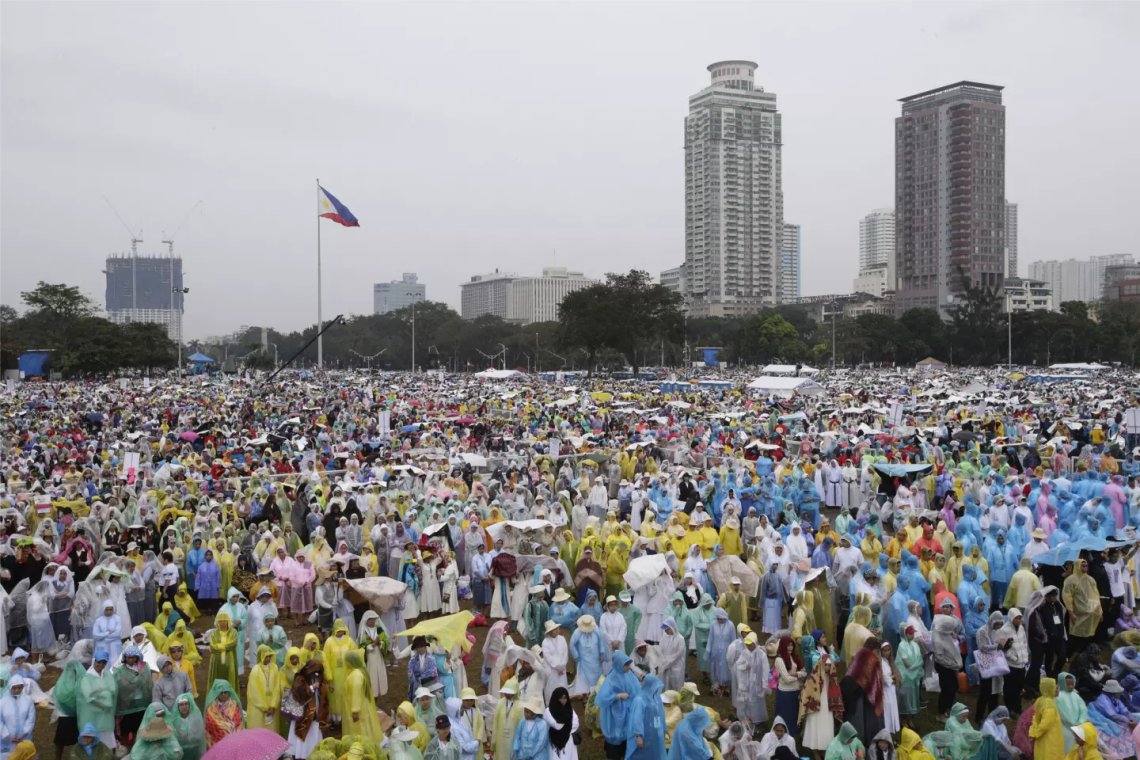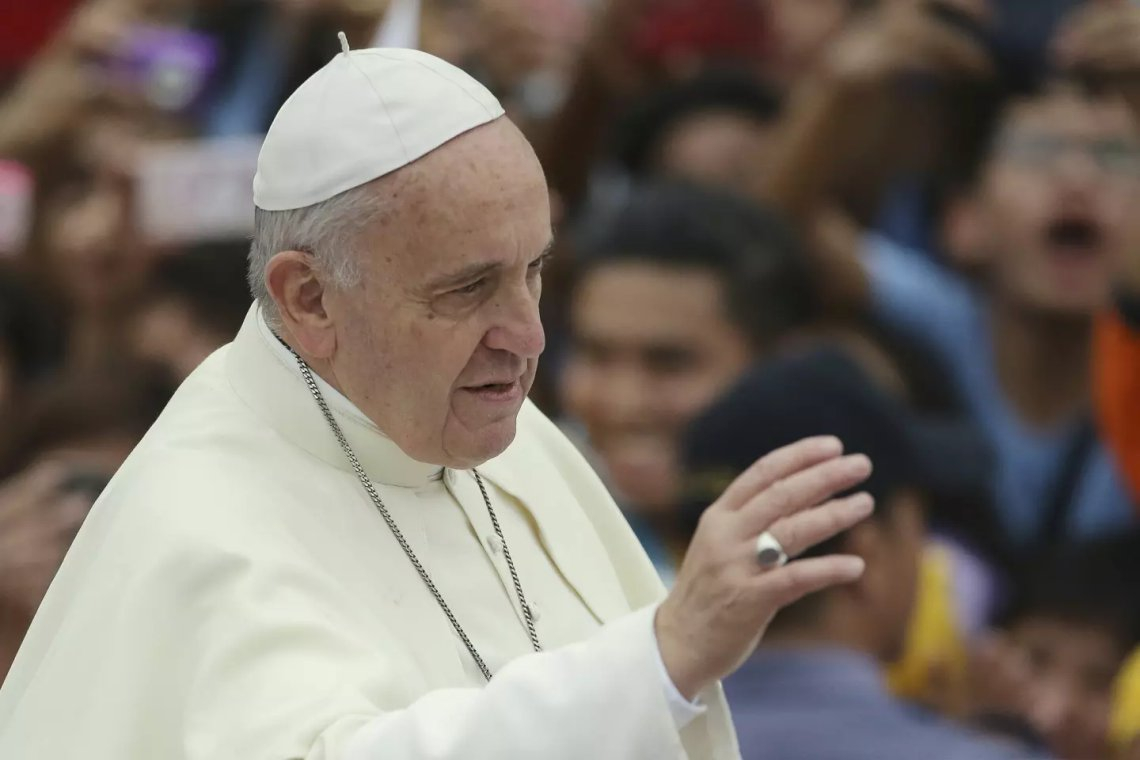Pope Francis in the Philippines, 2015. Image Source: Aaron Favila; Associated Press
The death of Pope Francis on April 21, 2025, at the age of 88 marked the close of a transformative and often unconventional papacy.
Elected in 2013, he broke centuries of precedent: the first Jesuit, the first Latin American, and the first non-European pontiff ever. He prioritized pastoral outreach over papal formality, placed the marginalized at the center of Church concern, and infused Vatican leadership with the perspective of the Global South—an approach that resonated far beyond Rome, including across the Philippines.
Pope Francis's passing came shortly after the conclusion of Lent and Easter for Christians, and Ramadan and Eid al-Fitr for Muslims—seasons of reflection and renewal that underscore his lifelong commitment to unity and compassion. For the Philippines—a country historically shaped by both Islam and Catholicism—this moment invites not only mourning, but a reexamination of how his legacy might inspire renewed commitment to ethical leadership and interfaith coexistence. Easter represents renewal and hope in Christian tradition, while Eid al-Fitr concludes a month of reflection and generosity in Islam. That these sacred seasons had just ended adds quiet symbolism in a region where Muslims and Christians have long lived side by side, often navigating their differences with resilience and shared values.
Francis and the Filipino Connection
The Philippines offered one of the clearest demonstrations of how deeply Pope Francis’s message could resonate—particularly through moments of national tragedy and public solidarity. His 2015 apostolic visit came in the wake of Typhoon Haiyan (Yolanda), one of the most devastating storms in the nation’s history. In Tacloban, surrounded by survivors still grieving and rebuilding, he presided over an open-air Mass amid driving rain and strong winds brought by another approaching storm. “I am here to be with you—a little bit late, but I'm here,” he told the crowd—many of whom had lost their homes, loved ones, or livelihoods. His presence, as much as his words, became a moment of healing.
During the five-day visit, he also celebrated Mass at Manila Cathedral, spoke to students and religious communities at the University of Santo Tomas, and met with then-President Benigno Aquino III at Malacañan Palace. The final Mass at Luneta Park attracted an estimated 6 to 7 million attendees—setting a world record for the largest papal gathering in history.
Filipinos affectionately referred to him as “Lolo Kiko”—a term of endearment combining the Tagalog word for grandfather with the localized nickname for Francis. In one of his last public audiences at the Vatican, he recalled this with warmth: “When I was in the Philippines, the Filipino people greeted me saying, ‘Lolo Kiko, Lolo Kiko,’ they said.”
But beyond sentiment, his message to the Philippines was pointed. He called on public officials to reject corruption, prioritize the poor, and uphold human dignity. In a country where faith shapes both public morality and political discourse, these appeals were not only for those in churches—but in Congress, communities, and conflict-affected regions such as the Bangsamoro.
✉ Get the latest from KnowSulu
Updated headlines for free, straight to your inbox—no noise, just facts.

Philippine believers gathered in the rain for mass with Pope Francis at Manila’s Rizal Park (2015). Image Source: Bullit Marquez; Associated Press
A Global Legacy with Local Resonance
At the heart of Lolo Kiko’s papacy was a call for the Church to reach “the peripheries”—those communities often ignored by political and religious power centers. “A Church that goes forth is a Church whose doors are open,” he said. His focus on proximity—on being present with the poor, the displaced, and the conflict-affected—redefined the Church’s global mission.
This message holds particular significance for Sulu and the wider Bangsamoro region, where centuries of Catholic influence and Islamic sovereignty coexist in both tension and trust. Francis’s advocacy for interreligious understanding presented a vision of faith as a force for unity rather than domination. This vision was powerfully embodied in the 2019 Document on Human Fraternity, which he co-signed with Grand Imam Ahmad Al-Tayyeb. The declaration called for “a culture of mutual respect in the awareness of the great divine grace that makes all human beings brothers and sisters.” It remains one of the most enduring blueprints for peace between Christians and Muslims in the modern era.
Francis’s advocacy for interreligious understanding presented a vision of faith as a force for unity rather than domination.
Faith, Power, and the Perils of Self-Interest
True to the broader vision he articulated throughout his papacy, Pope Francis consistently challenged leaders—both religious and political—who put self-interest above service. He often reminded the world that leadership rooted in faith must be humble, inclusive, and accountable. In his words: “A good leader must love his people, be humble, and always place the common good before his own interests.”
These reminders are particularly relevant in the Philippines, including both Manila and Sulu. In the capital, religious rhetoric has frequently been leveraged to advance nationalist messaging or secure political endorsements. Former President Rodrigo Duterte often combined spiritual references with strongman narratives. More recently, politicians such as Ferdinand Marcos Jr. and Vice President Sara Duterte have received bloc-voting religious endorsements, enabling them to project moral credibility while consolidating power.
In Sulu, the invocation of religious identity has occasionally been used to legitimize separatist aims or revive the symbolic authority of the sultanate. Certain self-declared heirs have drawn on religious and historical imagery not to unite communities, but to pursue political leverage and personal gain—often cloaked in calls for justice while quietly seeking control over monetary entitlements. Despite long receiving annual lease payments related to historical claims, these actors have shown little transparency or accountability in using such funds for the broader benefit of the Sulu community. Their rhetoric lacks the humility and service-oriented spirit that Pope Francis consistently called for.
Authentic leadership—whether spiritual or political—demands integrity, modesty, and a commitment to the common good. It is not a platform for personal enrichment, nor a tool to exploit sacred heritage or extract power from history. In a region still navigating its post-conflict future under the Bangsamoro peace framework, these values are not optional—they are essential.
A good leader must love his people, be humble, and always place the common good before his own interests.
Carrying Forward a Legacy of Moral Leadership
The death of a spiritual leader is always a moment of mourning—but it can also be a moment of moral clarity. As Filipinos reflect on the legacy of Pope Francis, and as the people of Sulu consider the path ahead, the question is not only what kind of leader he was—but what kind of leadership we now choose to embrace.
“Let us ask for the grace to be builders of peace,” Francis once urged. That work demands far more than words. It requires resisting those who distort faith for personal gain. It requires forming communities built on justice, not hierarchy. And it requires acknowledging that faith’s greatest purpose is not to divide, but to heal.
In honoring Pope Francis, the most meaningful tribute will not be in eulogy, but in action: choosing dialogue over confrontation, accountability over ambition, and reconciliation over resentment. In doing so, the Philippines—and especially the Bangsamoro region—can carry forward a legacy rooted not in power, but in peace.
REFERENCES
ABS-CBN News. (2025, April 21). Pope Francis, beloved 'Lolo Kiko' to Filipinos, has passed away: Vatican. ABS-CBN Corporation. https://www.abs-cbn.com/news/world/2025/4/21/pope-francis-beloved-lolo-kiko-to-filipinos-has-passed-away-vatican-1603
Catholic News Agency. (2015, January 18). 6 million attend Pope Francis’ final Mass in the Philippines. Catholic News Agency. https://www.catholicnewsagency.com/news/31290
Francis, P., & Al-Tayyeb, A. (2019, February 4). Document on human fraternity for world peace and living together. Vatican Publishing. https://www.vatican.va/content/francesco/en/travels/2019/outside/documents/papa-francesco_20190204_documento-fratellanza-umana.html
Pullella, P. (2015, January 19). Philippine crowd for pope's final Mass biggest ever. Reuters. https://www.reuters.com/article/us-pope-philippines-idUSKBN0KQ0TW20150119
Wooden, C. (2025, March 11). General Audience: Pope Francis reflects on humility and leadership. Vatican News. https://www.vaticannews.va/en/pope/news/2025-03/general-audience-pope-francis-humility-leadership.html



